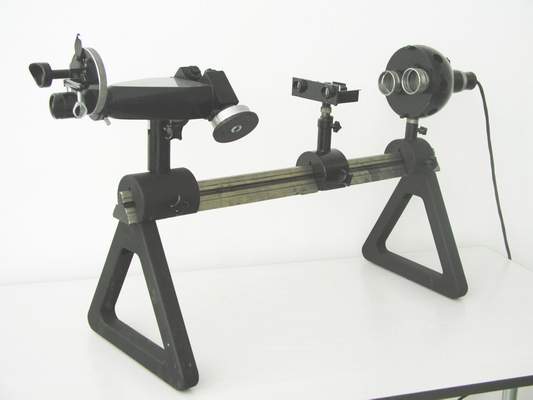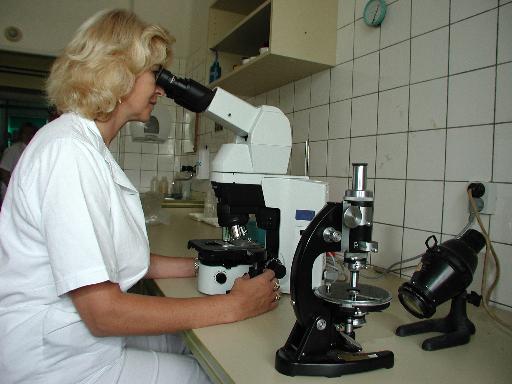History of the Institute of Clinical Biochemistry and Hematology
History of Clinical Biochemistry at the Faculty Hospital in Pilsen
|
Laboratory examinations were originally performed by nurses at the Department of Internal Medicine; these were: qualitative chemical examination of urine, simple biochemical tests in blood, and basic hematological examinations. The first laboratory technicians – among them was also the leading technician of the soon-to-become independent department Libuše Vodičková – started to work at the department of internal medicine at the beginning of 1950.
Administratively, the laboratory was housed by the Department of Internal Medicine and had no official head; at first it was informally overseen by Assoc. Prof. Mencl, who was interested especially in hematology, and later by Vladimír Piroch, M.D., who also specialized in diabetology. At that time the laboratory was supplied with the first instruments, including the Pulfrich´s subjective photometer (see picture).
|
Pulfrich´s subjective photometer |
During the years 1953-59, the head of the Central Laboratory of the Faculty Hospital (belonging still to the Department of Internal Medicine) was Luboš Jadrný, M.D., who specialized in internal medicine. Although starting as a part-time leader, Dr. Jadrný’s responsibilities at the laboratory gradually expanded and required full-time position. The laboratory moved to the newly built block No 10, where it can be found even at present. Many new methods were introduced, including determination of the clearance of endogenous creatinine and amylase activity. Dr. Jadrný focused on functional renal tests with great enthusiasm.
In 1959, the already independent Central Biochemical Laboratory of the Faculty Hospital announced a public competition for the head of the department, which served as a basis for the appointment of Vilém Lahn, M.D., Ph.D., to the position. At that time, the biochemical and hematological laboratories were already separated and further developed independently. Since 1962, the official name of the laboratories is Department of Clinical Biochemistry (DCB) of the Faculty Hospital. The equipment of the laboratory became modernized, new laboratory methods were developed. For example, put into operation were novel methods such as determination of aminotransferases and hormone metabolites. Furthermore, the department collaborated with many clinical departments on introducing new methods of treatment, including kidney transplantation. DCB also began to determine acid-base balance. At the end of the 1960’s, the first automated photometer was obtained.
Since 1954, the leading laboratory technician was Libuše Vodičková. Besides working for the department, she also devoted her whole-life effort to the function of regional laboratory technician. Her managerial, professional, and personal endowments had been helping others at the DCB until her retirement in 1989, when she was replaced by Jaroslava Kubínová.
In 1991, based on the public competition, Jaroslav Racek, M.D., Ph.D. became the head of the department. After his habilitation, Dr. Racek became an associate professor of biochemistry at the Medical Faculty of Charles University in Pilsen. The changes which appeared at the beginning of the 1990’s in the Czech society were also reflected in the formation and efficiency of the department: the instruments and equipment improved and many new methods were introduced. Worth mentioning is also the abundance of immunochemical methods available; beside specific proteins, the methods for determination of antibodies against hepatitis viruses and some other infectious agents were introduced; therapeutic drug monitoring along with its pharmacokinetic evaluation also commenced. The spectrum of toxicological analyses was broadened and their availability improved as well as the quality of urinary stone analysis. The number of actually performed methods exceeded 200. Computer technology was maximally utilized for the organization of laboratory work and the interpretation of results.
The number of analyses increased two-fold in 1994 as compared to 1989, which was accomplished by a significant increase in productivity in spite of an almost 30 % decrease of the number of employees. In addition to the Faculty Hospital, DCB served the continuously increasing number of private physician offices; special examinations were also performed for other hospitals and health care institutions of the West-Bohemian Region. Although clinical biochemical analyses within the framework of therapeutic and preventive care were always the main field of work, DCB engaged in research work as well. Several biosensors were constructed at the department, which can be declared as a world-wide priority. The problems of biosensors were also the topic of a research project that was supported by the U.S. government and solved in the cooperation with the Slovak Technical University in Bratislava. In 1994, the workers of DCB successfully solved the research project (IGA MH CR grant) concerning the effect of free radicals on various diseases and the potential of interference with their influence; in this area of research, DCB became one of the most prestigious departments in the Czech Republic and the results of many studies were published in reputable international journals. DCB then continued its research work in this field in cooperation with many departments of the Faculty Hospital and other institutions.
Teaching has also always been an inseparable component of the DCB activities. For many years, the staff of DCB instructed clinical biochemistry, including practical training, for the program of Laboratory Technician at the Secondary Medical School. Assoc. Prof. Racek and Dr. Holeček participated in teaching students of the Medical Faculty of Charles University in Pilsen. At the beginning, the courses were presented to study groups in the form of laboratory rounds within the framework of medical chemistry. After 1989, this teaching practice underwent a fundamental change; the course of clinical biochemistry became a required teaching subject at the Medical Faculty in Pilsen and it was delivered to the sixth - year General Medicine students during a 5-day session of lectures and seminars, concluded with a credit. The DCB staff was also involved in the teaching of a newly framed Bachelor Study of Nursing.
In 1985, the secondary section of DCB was created on the premises of the new Faculty Hospital in the Lochotín city quarter. The spectrum of methods performed at this department was gradually growing and it can be said that since 1994, when DCB became an independent department of the Faculty Hospital Lochotín, it was fully comparable to that performed at the central department on the old premises of the Faculty Hospital Bory. Hana Rusňáková, M.D., was appointed as the leading physician of the DCB Lochotín and the leading laboratory technician was Anna Čásová. In addition to her leading work, Dr. Rusňáková participated in the establishment of metabolic clinic at the DCB, specialized in diagnostics and treatment of lipid metabolism disorders. At first this clinic was a component of the 1st Department of Internal Medicine and later (since 1993) of the DCB.
|
Polarized light mocroscopy - old and present microscope |
On the initiative of Assoc. Prof. Racek and supported by the dean of the Medical Faculty in Pilsen, the Institute of Clinical Biochemistry and Laboratory Diagnostics (ICBLD) of Charles University Hospital was established on the premises of the University Hospital in Lochotín on January 1st, 1997. It was formed by the integration of three components:
Department of Clinical Biochemistry, routine laboratories of the Department of Clinical Hematology, and toxicological laboratories of the Department of Occupational Diseases. ICBLD was divided into three departments, with the aim of further consolidation of laboratory departments within the framework of this institute, according to the planned development of inpatient and outpatient parts of the new Faculty Hospital in Pilsen-Lochotín. Assoc. Prof. Racek was appointed as the head of ICBLD, Dr. H. Rusňáková became the deputy-director for therapeutic and preventive work, and the position of the leading laboratory technician was assigned to A. Čásová.
|
ICBLD was established as a teaching Institute of the Medical Faculty, working at the same time for the Faculty Hospital with the aim to fulfill three basic tasks; at the time of ICBLD establishment, these were:
- Teaching activities. The staff of ICBLD taught courses in clinical biochemistry to sixth- (later fifth-)year medical students, including in English language, and they participated in lecturing pathobiochemistry to fourth-year medical students. Furthermore, ICBLD assumed responsibility for teaching the "laboratory methods" course to students of bachelor studies at the Medical Faculty, both in presentive and combined study types. At the same time, the staff of ICBLD guaranteed to teach clinical biochemistry at the Secondary Medical School and Higher Medical School in Pilsen, including practical training of the laboratory technicians. ICBLD became the main centre within the West Bohemian Region for postgraduate education of laboratory technicians, physicians, and biochemists in clinical biochemistry.
- Therapeutic and preventive activities. Laboratories of ICBLD were able to ensure the availability of a large spectrum of laboratory clinical-biochemical methods for the entire West Bohemian Region; these methods included special biochemical tests,examination of blood cell count, hemocoagulation analyses, basic analyses in toxicology for patients with acute intoxications and a suspected drug abuse, as well as examinations in the field of industrial toxicology. Additionally, ICBLD performed the determination of therapeutic drug levels (including their pharmacokinetic evaluation), determination of some hormones, and serological diagnostics of viral hepatitis. The work of ICBLD was organized with the assistance of a network of the laboratory information system, directly linked to analysers and interconnected with the clinical network. Like the former DCB, ICBLD was linked to the national systems of quality assessment in biochemistry, hematology, and serology, and, in the case of some special biochemical tests, to the international systems for quality assessment. Operating within the framework of ICBLD was also a clinic for metabolic disorders, dispensarizating mostly patients with hyperlipidemia and other serious risk factors for atherogenesis.
- Research activities of the ICBLD was based on its own grant project supported by the Internal Grant Agency of the Ministry of Health, Czech Republic, as well as on its extensive participation in solving grant research projects of other departments and institutes of Charles University. The focus of the research activity of ICBLD was on the study of the effect of free radicals onetiopathogenesis and development of complications of some serious diseases; the aim of this applied research was to evaluate the role of antioxidants in the prevention and treatment of states such as atherosclerosis, malignant tumors, diabetes mellitus, etc.
With the coming of new management of the Faculty Hospital, the conception and organization of the laboratory complement was completely changed. Since January 1st, 2000, the hematological laboratory was excluded from ICBLD and became again a component of the Department of Clinical Hematology. On the same date, it was decided to integrate both of the clinical biochemical departments, ICBLD Lochotín and DCB Bory. The deputy director of ICBLD became, again on the basis of the public competition, Dr. V. Petříková and the leading laboratory technician J. Kubínová. ICBLD remained in this form until the end of January 2003 when, after its consolidation with the Department of Clinical Hematology of the Faculty Hospital, the Institute of Clinical Biochemistry and Hematology (ICBH) was constituted. On the basis of the selection procedure, prof. Jaroslav Racek, DrSc. became head of the Institute. MUDr. Vlasta Petříková was his deputy for clinical biochemistry and MUDr. Ivana Martínková deputy for hematology; Jaroslava Kubínová remained the chief laboratory technician.
One year later, in the management of the hematological part of ICBH Dr. Martínková (after leaving for the private sector) was replaced by MUDr. Jitka Šlechtová. After her retirement in 2018, MUDr. Zdeňka Hajšmanová took over the leadership.
In 2007, Mgr. Peter Lajoš became the chief laboratory technician of ICBH. In 2010, the position of Deputy Head of the Institute for Educational and Scientific Activities was established, to which MUDr. Daniel Rajdl, Ph.D. was appointed.
In 2019, MUDr. Vlasta Petříková retired and, based on selective procedure, MUDr. Marie Šolcová became deputy for clinical biochemistry.
Since 1st January 2022 Dr. Rajdl became head of the Institute, Prof. Racek works as Deputy Head of the Institute for Educational and Scientific Activities.

